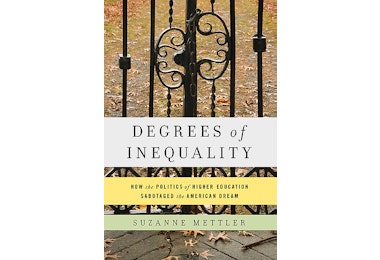Suzanne Mettler is the Clinton Rossiter Professor of American Institutions in the Government Department at Cornell University. Her research and teaching interests include public policy (including social welfare, tax, health, and education policies), American political development, political behavior and civic engagement, and inequality.
Mettler is the author of Degrees of Inequality: How Higher Education Politics Sabotaged the American Dream (Basic Books, 2014) and her current projects include a multi-year panel study of how health care reform influences public opinion, and an examination of how changes in social provision since 1980 have affected American’s attitudes about government and participation in politics.
Her previous books include: The Submerged State: How Invisible Government Programs Undermine American Democracy (University of Chicago, 2011); Dividing Citizens: Gender and Federalism In New Deal Public Policy (Cornell, 1998), which was awarded the Kammerer Award of the American Political Science Association (APSA) for the best book on US national policy and the Martha Derthick Award for a book that has made an enduring contribution to the study of federalism; and Soldiers to Citizens: The G.I. Bill and the Making of the Greatest Generation (Oxford University Press, 2005), which was also awarded the Kammerer Award as well as the J. David Greenstone prize of the Politics and History section of the APSA.
Mettler has also published in the American Political Science Review, Perspectives on Politics, British Journal of Political Science, Studies in American Political Development, and Journal of Health Policy, Politics, and Law, and other scholarly journals and edited volumes, as well as op-eds in the New York Times and LA Times, and contributed to The Washington Monthly and Salon.
Mettler’s research has been supported by the Russell Sage Foundation, Spencer Foundation, and Robert Wood Johnson Foundation. She serves on the board of the Scholars Strategy Network. She is the past president of the Politics and History section of the APSA and the president elect of the association’s Public Policy section.

